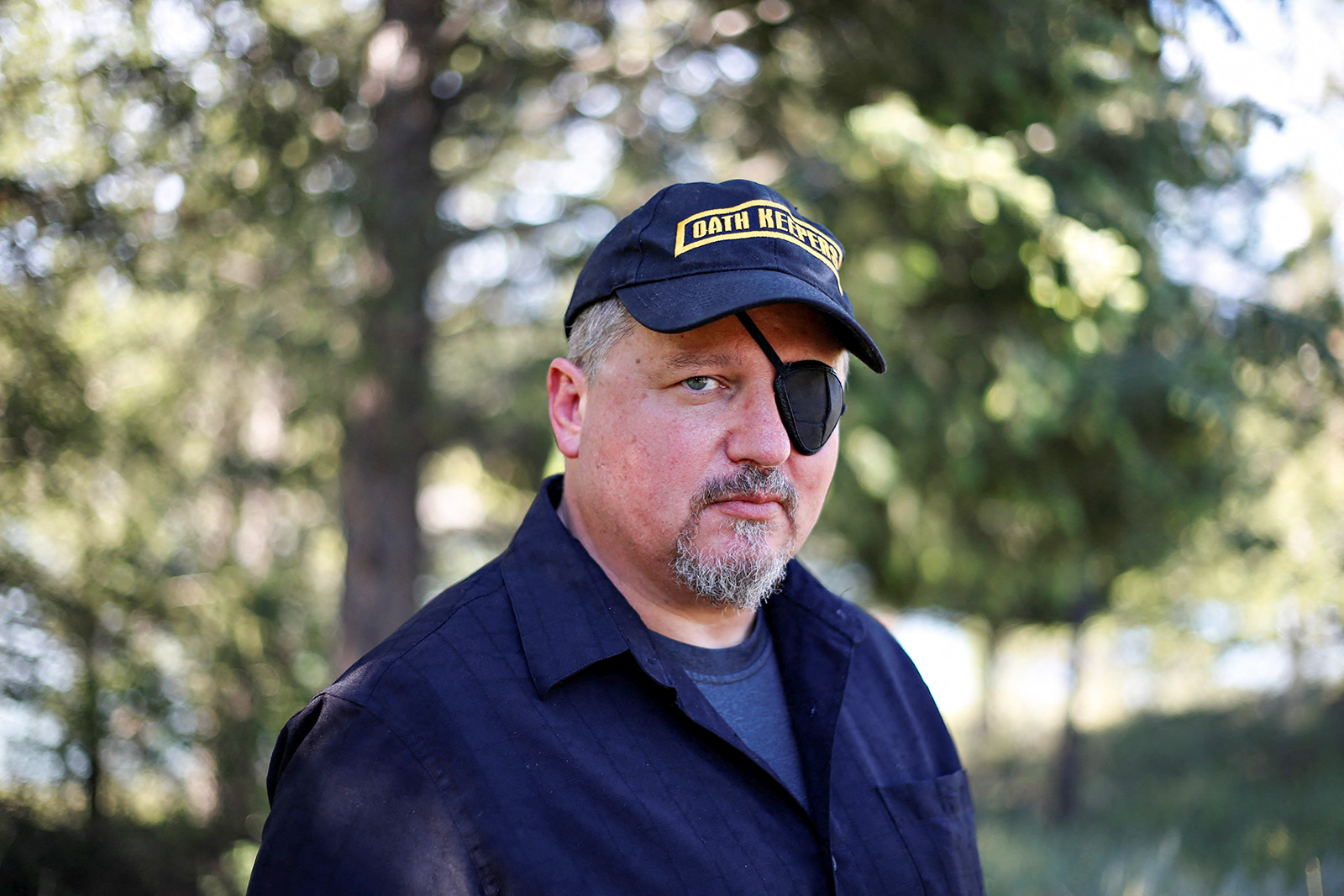Broken Oaths
As Oath Keepers founder Stewart Rhodes goes on trial this week in connection with the Jan. 6 U.S. Capitol riot, members of his estranged family — including his eldest son and ex-wife — reflect from their northwest Montana home on a fraught relationship with the militia leader
By Micah Drew
On Jan. 6, 2021, Tasha Adams watched on social media as a mob of Trump supporters stormed the U.S. Capitol in an attempt to stop the certification of Joe Biden as the winner of the 2020 presidential election.
Almost reflexively, she wondered what role the father of her six children had played in the attack.
“I knew leading up to it he’d be involved, but I wasn’t sure how involved,” Adams said in a recent interview with the Beacon.
“Then I saw the photo of the ‘stack’ going up the steps, and I thought, ‘oh boy, this is Oath Keepers,’” she added, describing the military-style formation the mob employed to breach the building. “Nobody else does that.”
Adams owes her familiarity with the Oath Keepers’ signature tactical strategies to her now-dissolved marriage to the group’s founder and leader, Elmer Stewart Rhodes III, whose far-right, anti-government militia was based in northwest Montana for nearly a decade, starting in 2011, a period during which the couple raised a family here, even as the organization expanded and new chapters developed nationwide, culminating in a membership of more than 38,000 followers.
“When J6 happened, I knew Stewart wouldn’t go into the Capitol, but would tell people to go in,” Adams said of the attack, which a House select committee has spent more than a year investigating as hundreds of people have been arrested and charged with crimes. “He always lived at the pivot point — he could say, ‘I’m with you, I’m right outside,’ but have the deniability of not having engaged himself.”
Rhodes has maintained that he never set foot inside the building; however, federal charging documents cite encrypted messages from Rhodes showing he was inside the Capitol grounds and led the planning efforts for Oath Keepers to use force to stop the presidential certification by Congress. On Jan. 12, 2022, Rhodes and 10 members of the Oath Keepers were indicted on federal charges alleging various degrees of criminal involvement in the insurrection. Rhodes’ charges include counts of sedition, conspiracy, obstruction of official proceedings, and tampering with documents or proceedings.
According to the documents, the co-conspirators “coordinated travel across the country to enter Washington, D.C., equipped themselves with a variety of weapons, donned combat and tactical gear, and were prepared to answer Rhodes’ call to take up arms at Rhodes’ direction.”
His seditious conspiracy trial begins Sept. 27 with jury selection, with news reports predicting opening statements could begin as soon as Thursday, Sept. 29; the trial is expected to span five weeks. In addition to Rhodes, four co-conspirators will stand trial alongside him, while three have already pleaded guilty, including William Todd Wilson, who told a judge that Rhodes spoke directly to a Trump surrogate on the night of the riot and tried to speak directly to the President.
The events surrounding the Jan. 6 Capitol riots are upsetting to Adams on many levels, especially as she describes being haunted by a feeling that the dissolution of her marriage to Rhodes set him off on a warpath.
“I still sometimes feel like I released him out into the world,” Adams said. “I think of him like a grenade where I was always putting the pin back in. Maybe none of this would have happened if we’d stayed with him, but if we hadn’t made the escape somebody might have died — or all of us.”

Rhodes was born in California and joined the U.S. Army as a paratrooper after high school. He graduated from Yale Law School in 2004 and made his first foray into politics working for Libertarian Ron Paul, of Texas, serving in his D.C. office and later working on his 2008 failed presidential campaign.
In 2009, largely in response to the election of Barack Obama as president, Rhodes founded the Oath Keepers, which the Southern Poverty Law Center characterizes as “one of the largest far-right anti-government groups in the U.S. that claims tens of thousands of present and former law enforcement officials and military veterans as members.” The Oath Keepers’ name derives from the oath that members of military and law enforcement take to “support and defend the Constitution against all enemies, foreign and domestic.”
Defending that oath and upholding the Constitution is, ostensibly, the group’s driving principle.
But those closest to Rhodes describe a man whose obsession with perceived government overreach was rooted in his own megalomania and served as the engine behind his power-mad agenda.
“Oath Keepers was our entire lives,” said Dakota Adams, Rhodes’ oldest son, now 25, who found his way out of the ideology in his late teens. He now writes extensively about his experience with the group using the online platform Substack, in a newsletter he calls, “Deprogram.” Rhodes’ five other children, including three who are minors, along with his ex-wife, Tasha Adams, still reside in northwest Montana. The other two adult children, Sequoia and Sedona, declined to be interviewed for this article, but both have spoken critically about their childhood, and their upbringing by Rhodes, in other media outlets.
Dakota characterized his father’s founding of the organization as stemming from a “lifelong obsession with the idea of being persecuted by the government.”
In the incipient years, Oath Keepers focused its mission on education about constitutional rights, “a libertarian version of the ACLU,” according to Tasha, who said Rhodes would correct anyone who characterized the group as a militia. Just a few years into its development, however, the Oath Keepers’ evolving credo instructed its members to form “civilization preservation” teams that included assembling and training local militia.
“It was an inevitability that he would turn Oath Keepers into his private army. He had a fantasy about being president, but really I think he wanted to see the world go down, and emerge as king of the apocalypse,” Dakota said. “He had this vision of himself as a major figure in American history and needed to become that figure.”
Sequoia, Rhodes’ oldest daughter, similarly characterized Rhodes’ ambitions as wanting “collapse, so he could be the king of the collapse … it was always going to go the way it did,” she said in an interview with the Southern Poverty Law Center (SPLC).
In 2011, Rhodes and his family moved to Montana, drawn to the Flathead area for its history with other anti-government militant groups, such as the Montana Freemen, Project 7 and the American Redoubt movement. They settled first in a “rundown crappy house” in Evergreen, Dakota said, which also served as a halfway house for Oath Keepers’ members; meanwhile, Rhodes professed to be scouting for a property in the area to develop into a compound that would become a rally point for the group.
“I remember at one point moving out of my room and sleeping in the hallway because we always had people associated with Oath Keepers come up and live with us while looking for a place to live,” Dakota said. “I remember one guy was really surprised because he expected to find Stewart living on a prepper ranch, and instead we were in a crummy rental in the ghetto of Kalispell.”
From Evergreen, the family moved up the road to Trego, which Rhodes began to convert into his hideout, building elaborate tunnel systems and spider holes to hide in, according to his family.
While in the Flathead, Rhodes and his family regularly attended Liberty Fellowship, whose pastor and founder, Chuck Baldwin, served as Oath Keepers’ national chaplain starting in 2013.
According to Dakota, Rhodes would routinely hijack post-church meetings at a downtown Kalispell diner and hold forth for hours as part of the “Stewart Rhodes show.”
As the oldest child, Dakota was the most involved in Oath Keepers. He described attending human tracking classes, participating in militia drills and driving with Rhodes to conventions and meetings with other Oath Keepers’ chapters. He also was tasked with translating Rhodes’ written screeds into coherent Oath Keepers newsletters, which were distributed to around 12,000 members. He says he even had his own set of childhood body armor, which Rhodes forced him to wear whenever the power went out, causing Dakota to think the house was being raided.
Dakota described Rhodes’ tight control over Oath Keepers — all decisions flowed through him — as his way to retain relevance, but also a downfall for the organization due to limits in his organizational skills and distrust of his allies.
“Any military training events were usually pretty miserable. Stewart was super gung ho about organizing them but not about participating because it would have shown he didn’t really know what he was doing anymore,” Dakota said. “We also never trained at home, so I operated at the level of a rank newbie every time. It would just be fumbling teenage Dakota thrown into tactical drills with some army infantry combat veterans and Stewart on the side with his coffee laughing at me, but then later he’d get mad because I made the family look bad.”
Tasha attributed a large portion of her guilt to the extent to which she enabled Rhodes and the Oath Keepers, encouraging the group’s success by helping to manage the organization.
Without assigning blame to his mom, Dakota acknowledges that “without her it would have been impossible.”
Rhodes’ biggest asset as a militia leader, according to his son, was his skill at exuding “traveling preacher charisma.”
“Stewart perceives talking to anyone as a public relations interaction — the show is always on,” Dakota said. “Stewart would morph to reflect his audience and he was very comfortable in a patriotic, American Christianity skin. He could channel that American evangelism emotion well. I also believe the only reason our family exists is to reinforce his image and tap into that family value appearance.”
Around the house, Tasha and her children described Rhodes as lacking hygiene, often going weeks without showering or changing clothes, and becoming increasingly violent and abusive.
According to a petition for a temporary restraining order filed in Lincoln County District Court, Tasha alleged he threatened to shoot the family’s dogs in front of his kids, and threatened to shoot himself in front of his wife.
In the petition, the family members also cite an incident in 2016, during which Rhodes allegedly attacked one of his daughters, grabbing her by the neck and choking her. At that point, the family dynamic shifted. Dakota said he was able to separate his sister and father during the physical confrontation but was challenged to a fight with Rhodes in the process.
After that, the family members began planning their escape.

“Our whole lives were about escape,” Tasha said. “Everything [Stewart] did, the reason we lived where we did in Trego, backed up to a National Forest, was all to get away if necessary.”
Tasha described how Rhodes built escape tunnels in the backyard of their property leading to logging roads where unregistered cars were stashed to make an escape to Idaho. Razor wire was on hand to block off the house in case “the feds” came. Each member of the family had snow-camo outfits to evade authorities in the event they were forced to decamp in winter.
That preparation mindset was helpful when planning how to escape the compound and abandon Rhodes, according to family members; Tasha said she spent the better part of two years carefully planning how to break free as safely as possible.
In 2018, the moment finally arrived. Tasha, all six children and the family’s dog piled into two cars and drove to Eureka. She called Rhodes from the courthouse and said she was filing for divorce and would attempt to obtain a restraining order. Rhodes promptly packed up his things and left their house, according to family members; Dakota claims Rhodes was worried a restraining order would have jeopardized his right to gun ownership.
Despite his departure, Rhodes remained in the area and retained custody of his minor children after a petition for a restraining order was denied.
“He could come and pick up my kids anytime he wanted,” Tasha said, adding that Dakota would go along with his siblings on any visit to ensure there was a level of supervision.
The family moved again, to a location unknown to Rhodes, and began to integrate into normal civilian life.
“There were a lot of steps to join the world,” Tasha said. “When we first got to Montana, there were no birth certificates, the kids had never been to schools or to doctors. It was hard to get all the records together.”
“It was just a nightmare,” she added. “It took three years to get everyone set up. And those early months was really just about getting the little kids caught up in school and trying to mentally heal.”
In 2019, the kids attended their first public schools, a “huge change that they really embraced.” Tasha said her kids joined sports teams — football, cross country, cheerleading — and went to school dances. It was the first peer socialization most of them had experienced.
“It was a crazy few years, but now we’re almost like normal people, and we get a lot of joy in that,” Tasha said. “If my 16-year-old comes home with gossip from school or stressing about something normal, Sequoia will tear up because her sister has normal things to stress about.”
Dakota and Tasha both say that, while they will occasionally worry over the lingering militia sentiment in the area, the Oath Keepers’ presence is diminishing, and many have disavowed Rhodes.
“One thing that certainly helps us is that on top of who he was, Stewart was just a normal jerk,” Tasha said. “He’d get kicked out of dentists’ offices, mechanics’ shops, churches. People didn’t like him anyways.”
“But psychologically, I still have this knee-jerk reaction that if something bad happens to Stewart, something bad happens to me and the kids,” Tasha added.
The last text message Dakota received from his father, on March 29, 2020, was about the COVID-19 pandemic.
“It is highly likely that COVID-19 is mutating as it goes and becoming more deadly to younger people … This is shaping up to be our Spanish flu that has potential to kill millions of Americans and bring on a Great Depression level of economic disaster with it as well as a potential constitutional crisis. Please be careful son. Please do all you can to keep the kids from catching it, I believe it’s a bioweapon.”
Shortly after that, Rhodes sent his estranged children a package that included N95 masks, but by the time it reached them, he had already pivoted to a stance on the public health crisis that more closely aligned with the anti-government rhetoric he fostered among the Oath Keepers. His strongly sympathetic, albeit brief, position on masking and other proactive health measures included writing an open letter to governors asking them to declare “pandemic health emergenc[ies], cancel public gatherings and church services, mobilize national guard units and distribute essential equipment and supplies to local hospitals.”
Following backlash to his letter from within the group, including the resignation of Chuck Baldwin as the Oath Keepers’ chaplain, Rhodes and the Oath Keepers began advocating against lockdowns and masking mandates while promoting conspiracy theories. For example, a 2020 report by the Center on Terrorism, Counterterrorism and Extremism characterized Oath Keepers-related social media accounts as “proliferating, among other dangerous rhetoric, QAnon-related language, false and harmful remedies for COVID-19, and the conspiracy theory that Bill Gates and Anthony Fauci are attempting to control minds through mandatory vaccines.”
“He could pivot 180 degrees in a heartbeat if he thought the public opinion of his circles was against him,” Dakota said. “But he would often get there too late because of his laziness and poor time management and sometimes the momentum would already be fizzling out.”
Like his mom, Dakota has been keeping tabs on Oath Keepers and Rhodes since the separation, as well as learning as much as he could about cult ideology to better understand his upbringing. He hopes to continue developing as a writer, but also feels an obligation to spend time in the political sphere, calling it a “duty.”
“I have a very particular perspective from the inside of Crazy-town and I feel like I have to be the first person to speak up if nobody else is, and if other people are then I have to add my voice,” Dakota said.

In the 21 months since the Capitol insurrection, more than 900 people have been arrested and charged with crimes. So far, 396 of them have entered guilty pleas.
The indictment against Rhodes and his 10 co-conspirators for “seditious conspiracy” is the most severe charge levied against any of the alleged rioters. If convicted, Rhodes faces up to 20 years in prison. According to the Washington Post, prosecutors will rely on up to 40 witnesses as evidence, as well as more than 800 statements by the defendants, hundreds of hours of video footage, tens of thousands of text messages, and hundreds of pieces of phone, location and financial data.
Rhodes and his attorneys have submitted to the court that their defense will rely heavily on the Insurrection Act, an obscure law that allows a president to call on the military or militias to suppress a domestic insurrection. Rhodes began calling on President Trump to invoke the Insurrection Act just days after the 2020 election, in speeches and appearances on the right-wing conspiracy show “Infowars.” He has submitted that the militia groups were in D.C. awaiting Trump’s invocation of the Act, which would have made their actions lawful.
According to the Post, at a Dec. 12 pro-Trump rally in D.C., Rhodes told the crowd that if Trump did not use the Act to quell “this insurrection” by president-elect Biden’s supporters in Congress, “we are going to have to do it ourselves later, in a much more desperate, much more bloody war.”
Rhodes has attempted to delay his trial multiple times, including most recently on Sept. 6, when he retained new legal counsel following a “near-complete breakdown in communication” with his previous lawyers, according to his motion. He previously submitted a motion for pre-trial release under supervision, but a judge denied it after Tasha Adams provided written testimony detailing Rhodes’ history of domestic violence and the escape tunnels he engineered.
“I honestly thought he might show up here and kill us all if he was released,” Tasha said. U.S. District Judge Amit Mehta, who will preside over the trial, has denied Rhodes’ motions.
“It was pretty gratifying to see that,” Tasha said. “I watched and had to deal with this behavior where there’s no consequences or accountability for Stewart ever. He would create havoc and then blame me or the kids. It’s fascinating to see him out in the world, trying his normal tricks and it’s not working anymore. Seeing a judge call him on it is fascinating.”
Tasha and Dakota will be closely watching the proceedings throughout the five-week trial, both hoping for a conviction that will keep Rhodes far from their family for decades.
“I feel very behind the curve as a person,” Dakota said, adding that he wants to be able to take college classes and write without having to keep tabs on his father. “I wasn’t allowed to have a regular social life of any kind. I wasn’t allowed to do anything except stay huddled in the house and wait for the end times. At some point I have to allow myself to live my own life.”
“After J6, Oath Keepers effectively does not exist,” Dakota added. “Oath Keepers resides in a jail cell. Hopefully this is where the story ends.”